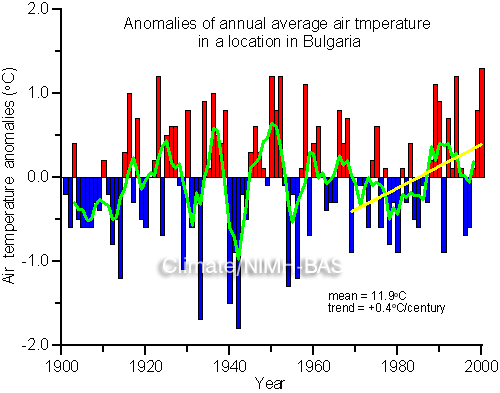Human Development and Climate Change in Bulgaria
"Fighting climate change: Human solidarity in a divided world" is the theme of 2007/2008 Human Development Report. With governments preparing to gather in Bali, Indonesia to discuss the future of the Kyoto Protocol, the United Nations Development Programme's Human Development Report has warned that the world should focus on the development impact of climate change that could bring unprecedented reversals in poverty reduction, nutrition, health and education.
"Ultimately, climate change is a threat to humanity as a whole. But it is the poor, a constituency with no responsibility for the ecological debt we are running up, who face the immediate and most severe human costs," commented UNDP Administrator Kemal Dervis.
The report comes at a key moment in negotiations to forge a multilateral agreement for the period after 2012 – the expiry date for the current commitment period of the Kyoto Protocol. It calls for a "twin track" approach that combines stringent mitigation to limit 21st Century warming to less than 2°C (3.6°F), with strengthened international cooperation on adaptation.
On mitigation, the authors call on developed countries to demonstrate leadership by cutting greenhouse gas emissions by at least 80% of 1990 levels by 2050. The report advocates a mix of carbon taxation, more stringent cap-and-trade programmes, energy regulation, and international cooperation on financing for low-carbon technology transfer.
Looking at this point of view it is true that climate change will be an obstacle for development. But it is not the climate change itself, but the policy of "fighting climate change" that will stop the progress.
Recent research from general equilibrium models suggests strongly negative impacts on European economies from adopting Kyoto targets (or going beyond the targets, as in the case of the United Kingdom). One model shows the economic effects by 2010 of adopting Kyoto targets as follows (remember that the Protocol achieves virtually nothing in reducing global temperature):
-
Germany -5.2% GDP / -1,800,000 jobs
-
Spain -5.0% GDP / -1,000,000 jobs
-
United Kingdom -4.5% GDP / -1,000,000 jobs
-
Netherlands -3.8% GDP / -240,000 jobs
Bulgaria continues to be in the group of countries with high levels of human Development, states the Human Development Index (HDI), which is an important part of the Human Development Report. The HDI for Bulgaria is 0.824, which gives the country a rank of 53rd out of 177 countries with data. During the last years Bulgaria ascends with one place each year in the HDI ranking.
With 0.1% of the world's population, Bulgaria accounts for 0.1% of global emissions – an average of 5.5 tonnes of CO2 per person. These emission levels are below those of Central and Eastern Europe and the CIS. If all countries in the world were to emit CO2 at levels similar to Bulgaria's, we would exceed our sustainable carbon budget by approximately 147%.
Bulgaria has signed and ratified the Kyoto Protocol. As an Annex I Party to the Protocol, Bulgaria is bound by a target to reduce its greenhouse gas emissions by -8% by 2008 – 2012.
The fear of climate change in Bulgaria is highly doubtful. Data from National Institute of Meteorology and Hydrology (Bulgarian Academy of Sciences) shows that such unprecedented climate change (global warming) has never happened in Bulgaria.
It's obvious that air temperature anomalies were stronger in 1950's than at the end of the century. Still, the yellow line shows the desire of Bulgarian scientists to prove some global warming in the country, but that's only the last 20 years. We can see the same temperature level as today even in 1923.



